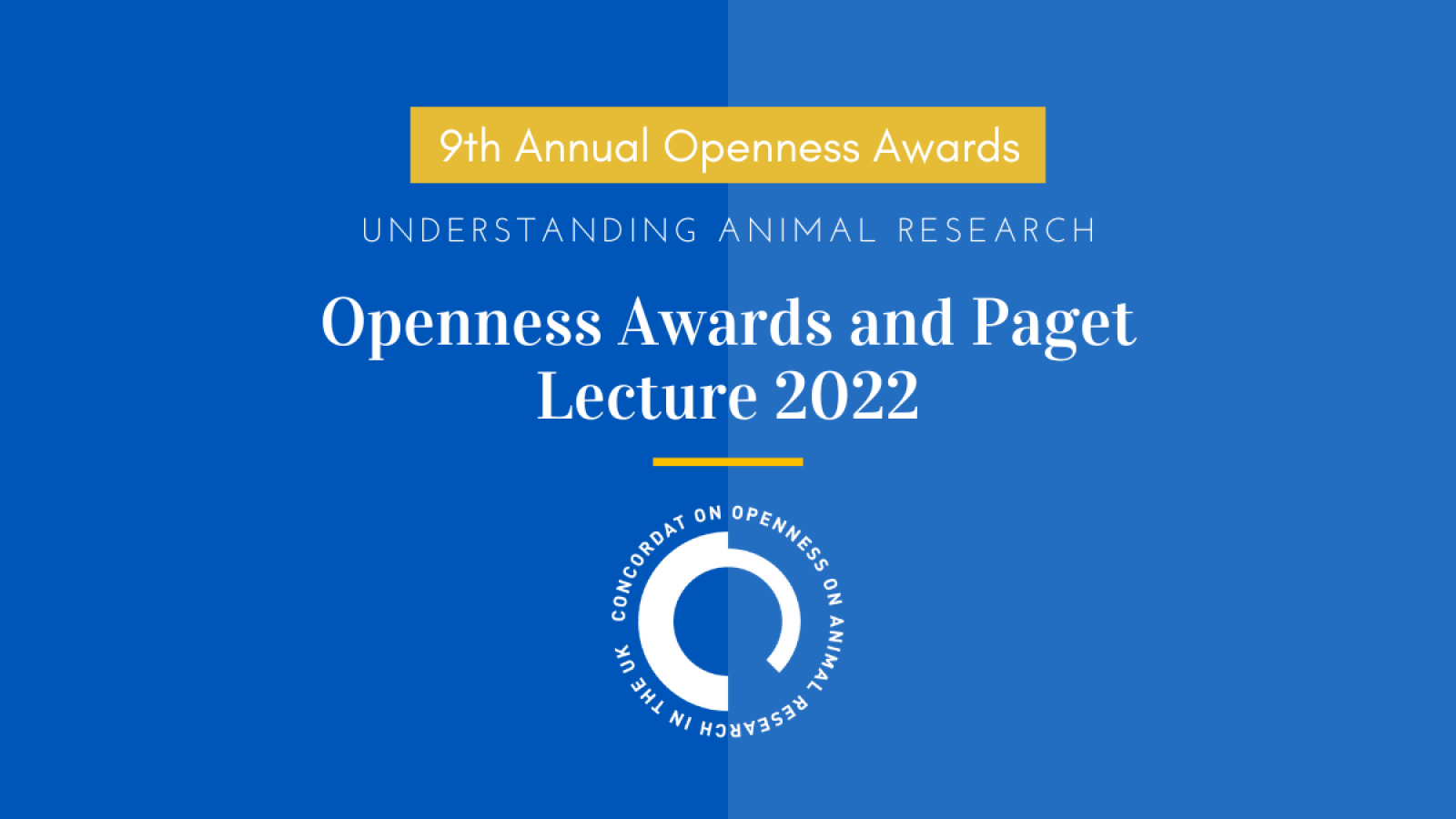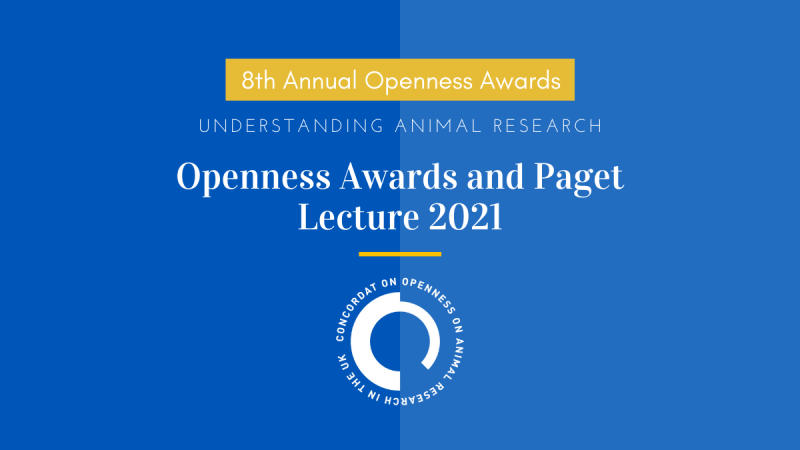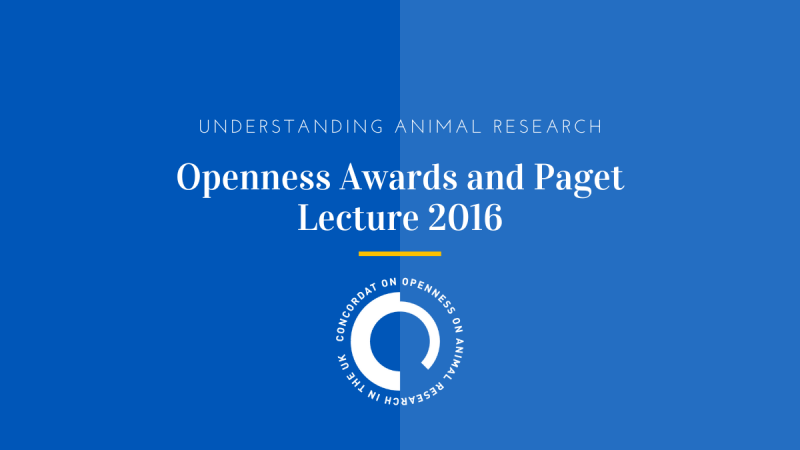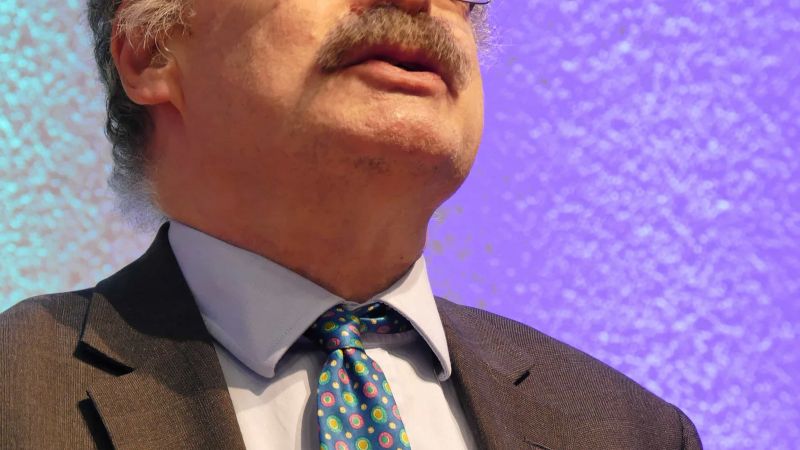Openness Awards and Paget Lecture 2022
On Monday, 5 December 2022, UAR hosted the ninth annual Openness Awards and 85th Stephen Paget Memorial Lecture at the Royal College of Physicians in London.
Concordat on Openness Annual Report
This October, we celebrated ten years since the Concordat began its journey. In October 2012, over 40 organisations involved with bioscience in the UK signed a Declaration on Openness on Animal Research. They committed to developing a Concordat setting out how they would be more open about the ways in which animals are used in scientific, medical and veterinary research in the UK. The following year, Understanding Animal Research conducted two pieces of public research to reflect and incorporate the views of the public and the wider research community. A public dialogue with Ipsos MORI to understand what people in the UK think constitutes openness and transparency about animal research and an Openness Consultation that would guide the final drafting of the Concordat. In May 2014 the Concordat on Openness was finally launched with 72 signatories, as a publicly accountable pledge to be more open about research involving animals. Nearly 9 years later, 127 organisations have committed to enhancing their animal research communications.
Wendy Jarrett, Chief Executive of UAR, welcomed the publication of the eighth annual Concordat report.
Signatories were asked to report their openness progress between May 2021 and May 2022, a period that still included many COVID-19 restrictions, But despite the disruptions to our daily lives, signatories continue to achieve excellent results. We have seen new web pages, virtual tours, images and videos, all of which make animal research more accessible to the public. We are also seeing signatories becoming bolder with their communications and using social media to reach more people.
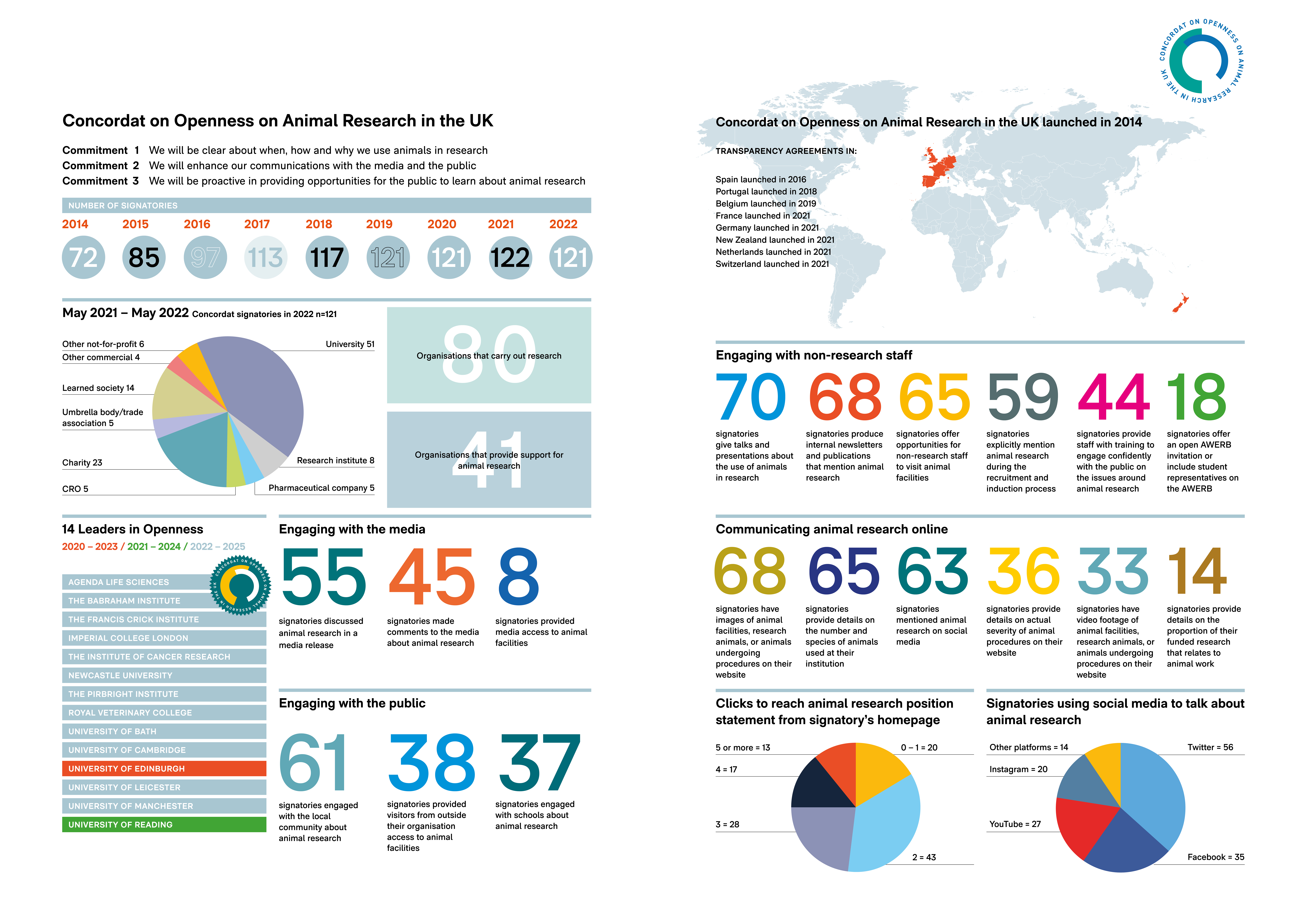
Sir Colin Blakemore
We remembered our good friend and colleague, Sir Colin Blakemore, who passed away earlier this year. Colin was a staunch supporter of openness and didn’t shy away from talking about his work to anyone who would listen. Colin was the recipient of UAR’s very first Openness Award in 2014, and his bravery in continuing to talk about the importance of research using animals in the face of animal rights extremism was an inspiration to many.
Fiona Fox, Chief Executive at the Science Media Centre, spoke about Colin's unwavering commitment to openness, especially in a time of animal rights extremism.
In memory of Colin, and with funding from the Biomedical Research Education Trust, we are delighted to launch the Sir Colin Blakemore Memorial Award in 2023. This award will recognise an individual from a signatory organisation that has worked to improve public understanding of how and why animals are used in the UK. We hope that the award will inspire researchers, animal care staff, communications professionals, and others to enter. More information will follow in the spring, and the first winner will be announced at the Openness Awards ceremony in 2023.
The Openness Awards
The first award of the evening was presented by Cherry Wainwright, Research Professor at Robert Gordon University in Aberdeen and the event's Paget Lecturer, to the University of Manchester for its multi-platform approach to engagement.
The University of Manchester has an excellent series of animal research webpages and a well-developed openness programme, which has been enhanced by a brand-new video featuring the day in the life of an animal technician. Led by one of the university’s lab technicians, the video gives an engaging overview of the facilities, species used, and the areas of research being studied. While the video itself represents great openness, the judging panel were particularly impressed by the sharing and promotion of the video across social media using a wide variety of platforms. Producing good, tailored content for each platform, and being brave enough to share it widely is challenging for any large organisation and requires considerable expertise and effort. The university’s considerable efforts were rewarded by the extent to which the video has been watched and shared widely.
The second award was presented by Lesley Penny, Director of Bioresearch and Veterinary Services at the University of Edinburgh, to the Francis Crick Institute, for its public engagement activities; in particular its use of Instagram stories.
The Crick does not shy away from talking about its use of animals. While they have received recognition before, this year the judges were impressed with the way that high-quality examples of openness were embedded throughout their public engagement activities. From patient stories of cancer survivors to technically complex scientific case studies, they ensure that the principles of the 3Rs and examples of where animals have been used can be found appropriately throughout their public engagement activities. Video interviews on the website include topics that are rarely found in public-facing animal research engagement material. For example, an open discussion of the limitations of both animal and non-animal experimental models.
What sets The Crick's approach apart this year was the use of Instagram Stories to reach a new audience; an approach which is both novel and brave.
The third award was presented by Claire Cockcroft, Director of the Thatcher Scholarship Programme at Somervill College Oxford, to the University of Reading for its novel and sophisticated approach to communicating challenging issues.
At a recent two-day protest, timed to coincide with an Open Day, staff from the University of Reading spoke to a small group of protestors. Over a cup of tea (with soya milk) the two parties had an open chat about some of the issues. Material was exchanged, some photos were taken, and the University honoured a promise to share the protestors' key points, including links to websites, to all staff involved in animal research, including PPL holders.
The judges felt that the University of Reading took a bold and sophisticated approach to debate and ethical commentary about animal welfare. They actively welcomed debate, rather than stifling it. Changing the narrative around a protest by supporting its principles, while showing that there are multiple voices and positions concerned with the use of animals in research, was disarming, helpful, and above all, open. The approach taken appears so simple that the skill involved in shaping this type of communication can easily be unrecognised. This is a highly professional approach developed by an empowered and insightful communication team, and they created an excellent news story.
The final award of the evening was presented by Wendy Jarrett to Bella Lear, Chief Executive at Understanding Animal Research Oceania, for her unwavering commitment to Openness during her time as Head of Engagement at UAR.
Many thanks to all our presenters and a huge congratulations to all the Openness Award winners!
The Stephen Paget Memorial Lecture
The Stephen Paget Memorial Lecture celebrates the life of Stephen Paget who passionately believed that a greater understanding of physiology would lead to better medical advances. He was the founder of the Research Defence Society which later became Understanding Animal Research. This year Professor Cherry Wainwright presented the 85th Paget Lecture, with her talk "Getting to the Heart of the Matter: How animal research has helped us understand and treat cardiovascular disease".
Cherry is the Director of the Centre for Cardiometabolic Health Research and Co-Director of the Centre for Natural Products in Health at Robert Gordon University; she is also a member of her university's AWERB. Cherry is currently Vice President (Meetings) for the British Pharmacological Society, and within the BPS she has served on the Integrated Pharmacology and Animal Welfare Panel for several years.
Her research focuses on cardiovascular disease, where she looks at the mechanisms underlying the pathophysiology of the disease to identify novel therapeutic targets for treating cardiovascular diseases.
Cherry has worked with numerous animal models throughout her career, from rodents and rabbits to larger animals such as pigs and dogs. When she moved to Robert Gordon University in 2003, the university didn’t have an animal facility, so she focused on cell work. However, because the cardiovascular system is fully integrated, and changes can affect the whole body, she faced limitations. So, the university applied for an establishment licence, which meant Cherry was able to work with mice again.
Before the lecture, UAR interviewed Cherry about her career.
From Egyptian mummies to modern-day stents, Cherry covered key milestones in cardiovascular disease research during her lecture. She spoke about the many animal models she and her collaborators used to understand and treat heart disease, as well as the limitations experienced in this field.
You can also download the lecture.
Transcripts for previous Paget Lectures going back to 1927, and videos going back a little less far, can be found here.
Last edited: 19 December 2022 09:48

